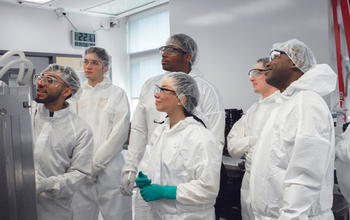NSF and SRC invest in 6 sites for undergraduate research experiences in semiconductors

Undergraduate students will gain hands-on experience in semiconductor research.
April 27, 2023
The U.S. National Science Foundation, in partnership with Semiconductor Research Corporation, or SRC, awarded six new grants that will provide undergraduate students with hands-on research opportunities in STEM priority areas related to semiconductors. These are the first awards under a five-year agreement, announced in January 2022, between NSF and SRC to jointly support awards through the NSF Research Experiences for Undergraduates program. The six new REU sites provide eight to 10 weeks of research and professional development activities during the summer for about 10 students.
"Building the U.S. workforce in semiconductors and microelectronics is a national priority where NSF has a critical role," said NSF Assistant Director for Engineering Susan Margulies. "We are excited to engage a diverse set of students in semiconductor research through this partnership with SRC, which will help and enable future advances and U.S. competitiveness."
"Materials and chemistry research are essential to the semiconductor industry and the American economy as a whole. These new student opportunities will give young people in multiple states the opportunity to explore the structure and properties of advanced materials while gaining the hands-on experience they need to launch a promising career," said NSF Assistant Director for Mathematical and Physical Sciences Sean L. Jones.
The six REU sites are:
- Chemistry Pathways to Building Functional Materials at the University of Texas at Dallas.
- Materials for Future Computing, Carnegie Mellon University.
- Nanophotonics, Quantum Photonics, and Vision/Biomedical Optics at the University of Rochester.
- Novel Techniques and Applications in Catalysis Research Development and Molecular Dynamics, University of Pennsylvania.
- Semiconductor Electronics and Photonics at University of Dayton.
- Semiconductor Hands-On Research Experience, University of Michigan.
"SRC is excited to kick off this REU program with NSF for semiconductor workforce development," said Roman Caudillo, director of the SRC-led Joint University Microelectronics Program, or JUMP 2.0. "These six REU sites represent just the first effort of our five-year partnership, laying the foundation for a pipeline of semiconductor engineers from undergraduates to advanced degrees. By connecting the REU program with the flourishing SRC Talent Factory and its robust research community, we envision a synergistic amplification of positive effects — REU students will be inspired by the breadth and depth of the cutting-edge JUMP 2.0 research defining the technologies of tomorrow and JUMP 2.0 will benefit from the energy and imagination of these talented and motivated undergraduate students."
Since 1987, the REU program has supported students to conduct intensive, authentic research in any of the areas of science, technology, engineering and mathematics normally funded by NSF. Approximately 6,000 college and university students participate in REU sites every year, mentored by faculty members and other senior researchers. New REU sites are established based on NSF's review of proposals submitted to an annual competition.
"This new partnership with SRC is an example of how the public and private sectors can join forces to grow the workforce in an industry that is critical to the U.S. economy," said James L. Moore III, NSF's assistant director for STEM Education. "Hands-on research opportunities like those provided by the REU program give practical depth to what students learn in the college classroom and prepare them to work in real-world research settings in academia, industry or government."
For more than 70 years, NSF has recognized the central role that partnerships play in achieving the United States' research and development objectives. To learn more about NSF's partnership activities, visit nsf.gov.
-NSF-
Media Contacts
Media Affairs, NSF, (703) 292-7090, media@nsf.gov
About SRC
SRC, a world-renowned, high technology-based consortium, serves as a crossroads of collaboration between technology companies, academia, government agencies and SRC's highly regarded engineers and scientists. Through its interdisciplinary research programs, SRC plays an indispensable role in addressing global challenges, using research and development strategies, and advanced tools and technologies. Members of SRC work synergistically together and gain access to research results, fundamental IP and highly experienced students to compete in the global marketplace and build the workforce of tomorrow.
The U.S. National Science Foundation propels the nation forward by advancing fundamental research in all fields of science and engineering. NSF supports research and people by providing facilities, instruments and funding to support their ingenuity and sustain the U.S. as a global leader in research and innovation. With a fiscal year 2023 budget of $9.5 billion, NSF funds reach all 50 states through grants to nearly 2,000 colleges, universities and institutions. Each year, NSF receives more than 40,000 competitive proposals and makes about 11,000 new awards. Those awards include support for cooperative research with industry, Arctic and Antarctic research and operations, and U.S. participation in international scientific efforts.
Connect with us online
NSF website: nsf.gov
NSF News: nsf.gov/news
For News Media: nsf.gov/news/newsroom
Statistics: nsf.gov/statistics/
Awards database: nsf.gov/awardsearch/
Follow us on social
Twitter: twitter.com/NSF
Facebook: facebook.com/US.NSF
Instagram: instagram.com/nsfgov


